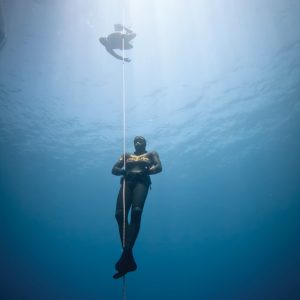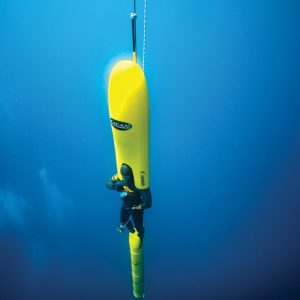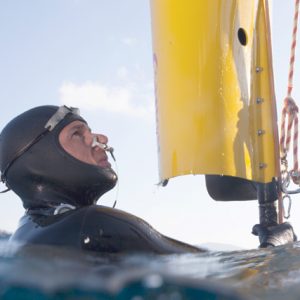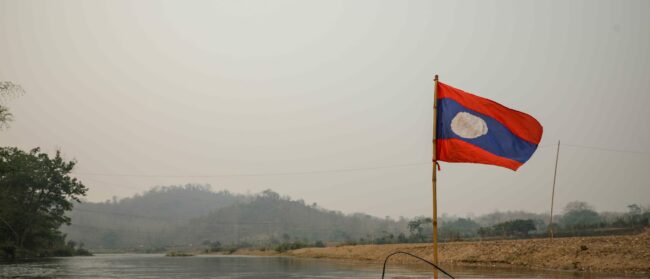On June 6, 2012, Herbert Nitsch fell asleep. On an average day for an average man, this would be unremarkable. But Nitsch is anything but average. He is a world-famous freediver with 33 records to his name and an innate sense of curiosity to see just how far his limits lie.
That summer’s day off the Greek isle of Santorini – a picturesque holiday spot whose beauty belies its history of catastrophic volcanic eruptions – marked his attempt to break his own 2007 world record in the ‘No Limit’ discipline.
Freedivers, functioning on a single breath and using no breathing equipment, plummet to staggering depths, many using a heavy ‘sled’ to weigh them down. For Nitsch, who can hold his breath for more than nine minutes at a time, that would mean dropping to a mind-boggling 253.2 metres, or 830.8 feet.

“It’s not just holding your breath and seeing how long you can bear it,” says Nitsch, who is known as ‘the deepest man on Earth’. “The main issue is the pressure. You can feel it on the cavities of the body – mainly the lungs, the sinuses and ears.”
At first, the dive went to plan. While on the surface, he used a breathing technique to ‘pack’ in air, enabling him to suck an extra five litres into his lungs. Once below, he expelled his breath into two connected Coke bottles, sipping it on the way down to help him equalise.
In the depths of the Aegean Sea, Nitsch surpassed his target. But on ascent, as the now-buoyant sled brought him back to the surface, a combination of nitrogen narcosis (a dream-like state caused when nitrogen enters the bloodstream at pressure) and his already relaxed state of mind led sleep to take over, with Nitsch still enveloped by a blanket of blue.
The chain of events that had led Nitsch from his native, and land-locked, home of Austria to this defining moment were, as they often are, the result of chance.
In the late 1990s, his scuba diving equipment was lost in transit during a holiday to Egypt. He went snorkelling instead and began taking photographs of the underwater environment. Spurred on by a friend, he measured how deep he could go. It was 32 metres.
Over the years, fuelled by the freedom and interactivity with the marine world that the sport can bring, the professional pilot fine-tuned his training, even when on land. Whether conducting breath holds on his sofa or while cycling on a stationary bike in the run up to a dive, his body learnt to adapt, and world records, which Nitsch still describes as a ‘minor part’ of his freediving ‘hobby’, rolled in.
“By trying to see where your limits are, you are also pushing the limits,” explains the 45-year-old. “It’s much more competing against yourself than competing with others.”

Yet back at Santorini, despite all the stringent safety measures put in place, the situation was deteriorating.
Safety divers, who Nitsch says thought he was distressed due to a lack of air, unbuckled him from the sled at 24 metres below the surface.
The action woke him up, and video footage shows him trying to grab a safety line. Not knowing what had happened, the divers then brought him up to the surface without Nitsch completing an all-important one-minute safety stop.
“The confusion was perfect. Nobody really knew what was going on. I knew I had to go down as quickly as possible to make a decompression stop on pure oxygen,” he recalls.
Nitsch knew that to reduce the risks of decompression sickness (DCS), a condition that can affect divers who ascend too quickly and caused by bubbles of nitrogen being released into body tissue and the bloodstream, he would have to descend again under the waves.
He went back down to ten metres, breathing from a tank of pure oxygen for half an hour. But severe DCS, which develops gradually, was already beginning to take hold. “I felt the right side of my body was getting more and more numb – my right arm and right leg. I was also getting very dizzy, to the point where I was afraid to black out because things were getting worse and worse.”
Concerned that he would fall unconscious under water, he signalled to the safety divers to activate an emergency rescue plan of flying to Athens to enter a recompression chamber. Logistically, however, the process took hours and a first treatment was aborted.

Nitsch was later diagnosed with DCS-type 2, which is associated with neurological problems. In his case, nitrogen bubbles blocked his blood flow, effectively causing multiple strokes.
“I was constantly dizzy, I couldn’t see properly… had double vision, no sense of balance. You cannot really imagine that, but I was even afraid of falling out of bed. The prognosis was not so good… I heard that the best case would be that I ride a wheelchair for the rest of my life.
“This was not super motivating. Looking at your own body, [going] from a top athlete to your body having tubes out [of it]. I was thinking about suicide.”
Thankfully, from that darkest of places, the outlook gradually improved. Ever a pioneering spirit, Nitsch later made the decision to leave an Austrian rehab centre and go it alone – a move he calls “one of the best decisions I ever made”.
From brushing his teeth with his weakened right hand to riding a bicycle, his body slowly healed. Three years on, though still suffering from balance and coordination issues and sometimes “getting caught on his words”, he is freediving again, touring the world giving lectures and tackling another issue close to his heart: the environment.
With decades of experience of the globe’s oceans, he has seen environmental degradation first-hand and is now on the ocean advocacy advisory board of the Sea Shepherd Conservation Society, which actively attempts to protect oceanic environments and wildlife. “What good is a law on fishing quotas, for example, if it’s broken by a factor of ten?” he asks.
The seas of Southeast Asia, where Nitsch has spent time over the past year with visits to Thailand, Singapore, Indonesia and the Philippines, are far from immune from the pressures piling up on the maritime ecosystems.
“I love the Philippines. I’ve just been there recently again. I have lots of friends there. But the oceans are decaying very, very quickly,” says Nitsch, detailing the negative impact of dynamite and cyanide fishing on the environment.
The freediver also highlights the death toll of sharks from finning to fuel Chinese appetites for shark fin soup and the effect of plastic pollution, which can enter the food chain. “Sooner or later, and I think sooner, the oceans will simply die,” he says.
But despite the worrying state of the world’s seas, Nitsch’s close relationship with the water remains. He is currently designing a solar-powered eco-boat, with automatic moving kites to harness the wind, and plans to live on the vessel for six months at a time, exploring huge expanses of sea.
“I was exposed to the oceans at a young age and when you’re diving it’s an experience that you don’t want to miss,” he says. “If you are a hamster living in a cage, you are happy to go in the hamster wheel. But if you explore the world, you don’t want to go back in the cage.”


